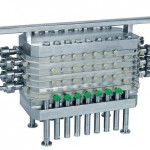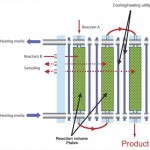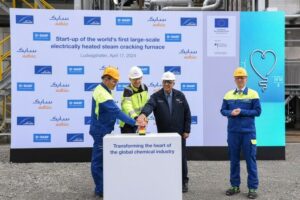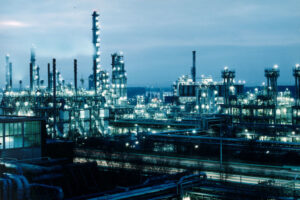Against the background of sharp international competition and constantly more stringent environmental constraints, chemical installations and equipment which provide high yields, safety and availability as well as optimum energy efficiency are the heroes of the hour. ART plate reactors from Alfa-Laval meet these demands. They combine a plate heat exchanger with a continuously operating reactor.
ART plate reactors make the continuous production of fine and special chemicals a reality, and they also represent an attractive alternative for the pharmaceutical industry. Compared with traditional stirred-tank reactors, ART plate reactors allow rapid expansion, higher yields and better control of the reaction.
Modular reactor unit
Alfa Laval plate reactors unite the properties of continuous chemical reactors with those of plate heat transfer units. Located between the heat transfer plates are reactor plates which influence the flow direction. Pressure plates ensure the assembly stays securely together and the whole forms a modular reactor unit. Connections along the reaction channel provide access to the reaction mixture, which allows measurements to be made, samples taken and reactant substances added. The mechanical design of the ART plate reactors permits reactions at temperatures from -40 to +200 ºC and pressures up to 20 bar. The product range includes units with capacities from 0.25 to 1 m3/h, which means that applications in the R&D laboratory are covered just as efficiently as immediate use in actual production.
The advantages offered by ART plate reactors to users in the chemical and pharmaceutical industries are many and varied. The very good heat transfer capacities typical of the plate heat transfer unit are combined with a highly efficient mixing process, which in turn means that the sequence of reactions in the unit can be reliably controlled. Existing processes can be improved and new products developed. In contrast to a reactor working in batch operation, the reaction partner substances are continuously fed into the ART plate reactor. This method is safer because the reaction volume is up to 99 % less than with batch processing. Furthermore, the reaction partner substances must be diluted with solvents in reactors for batch operation. ART plate reactors, on the other hand, work with source materials in the optimum concentration, enabling the occurrence of by-products to be reduced. No solvents are evaporated and energy costs are lower. Another point in their favour is that ART plate reactors can be very easily automated.
The reactors, which at present are available in two sizes, can be readily adapted to varying process or performance requirements. Users can resort to different plate sizes for this purpose. In addition, the reactor can be used with a different number of plates. These can be supplied in various materials: 316 L, C-22 or PEEK. And when it comes to ease of cleaning, ART reactors are extremely convenient because they can be dismantled and reassembled in a matter of minutes.
A short history
The advanced reactor technology is based on Alfa Laval’s vast know-how in the field of heat transfer and fluid dynamics. Back in the 1930s, the company carried out pioneering work in the development of plate heat transfer systems. In those days such systems were used primarily to pasteurise milk, beer and so on, while later on they also came into their own in other branches of industry such as chemicals and pharmaceuticals. All this became possible thanks to new plate materials and manufacturing processes.
Ongoing further development of the plate heat transfer devices has now led to the ART plate reactors. When developing and testing this reactor type, Alfa Laval worked closely with a number of European universities. Prototypes of the ART plate reactor have already been successfully tested at Astra Zeneca (Sweden), Perstorp AB (Sweden), Arkema (France) and DSM Pharma (Netherlands).
cpp 427
Product range
Heat exchangers info page
Share:








